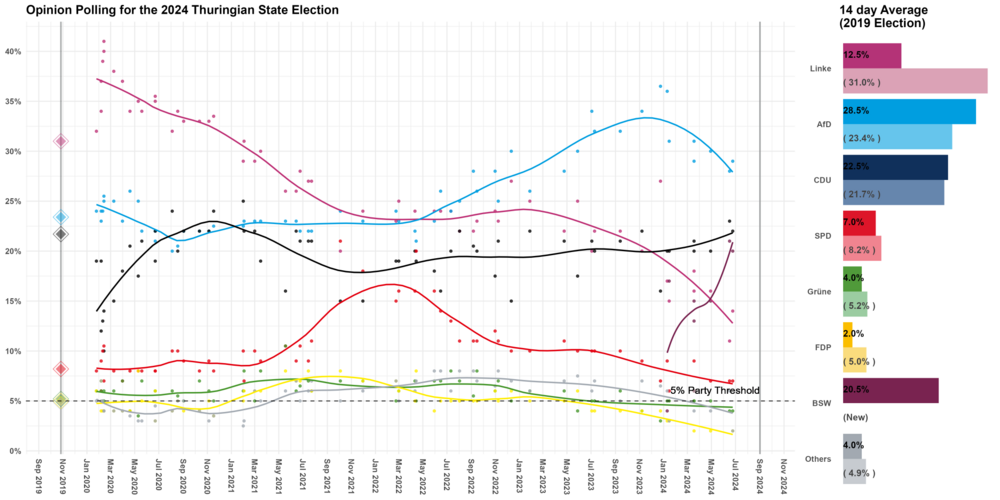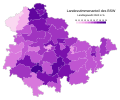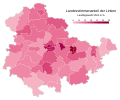|
2024 Thuringian state election
The 2024 Thuringian state election was held on 1 September 2024 to elect the members of the 8th Landtag of Thuringia.[1] It was held on the same day as the 2024 Saxony state election.[2] The outgoing government was a minority government consisting of The Left, the Social Democratic Party (SPD), and The Greens, led by Minister-President Bodo Ramelow of The Left. The Alternative for Germany (AfD) became the largest party with 33% of the vote, its best ever performance and the first time it placed first in a state election in Germany. The incumbent governing coalition suffered dramatic losses; the Left lost more than half its support and fell to fourth place on 13%, while the SPD recorded its worst result in any postwar state election. The Greens and the Free Democratic Party lost all of their seats. The Christian Democratic Union (CDU) recorded small gains and came second with 24%. The newly-founded Sahra Wagenknecht Alliance (BSW) debuted in third place at 16%.[3] The AfD became the first far-right party in Germany since the Nazi Party to win a plurality of seats in a state election.[4][5][6][7][8] Election dateAccording to § 18 of the Thuringian Electoral Law for the Landtag,[9] the Landtag election must take place on a Sunday or public holiday at the earliest 57 months after the beginning of the current parliamentary term on 5 February 2020 and at the latest 61 months after, i.e. at the earliest in August 2024 and at the latest December 2024.[10] According to the Thuringian Constitution, an early election may be held if, at the request of one-third of its members, the Landtag votes with a two-thirds majority to dissolve itself. This may also occur if the Landtag does not vote confidence in a Minister-President within three weeks of a failed vote of confidence in the incumbent. The motion to dissolve the Landtag may only be voted on between eleven and thirty days after its submission. If passed, the election must then take place within 70 days. Proposed early electionIn the aftermath of the 2020 Thuringian government crisis, The Left, CDU, SPD, and Greens came to an agreement to dissolve the Landtag and schedule a new election for 25 April 2021. At the time the four parties held a combined 63 of the 90 seats, two more than the 61 votes required for a dissolution.[11] That January, the four parties agreed to postpone the election to 26 September 2021, the same date as the upcoming federal election.[12] The vote to dissolve the Landtag was scheduled for 19 July 2021. However, the motion was withdrawn on 16 July after four CDU and two Left members informed party leaders they would vote against it, leaving it clearly short of the required majority. Left parliamentary leader Stefan Dittes announced there would not be another effort to dissolve the Landtag, and the red-red-green minority government continued for a full term.[13][14] BackgroundPrevious electionIn the previous state election held on 27 October 2019, The Left became the largest party for the first time in any German state, winning 31.0% of votes cast. The Alternative for Germany (AfD) made the largest gains, increasing its vote share by almost 13 percentage points and became the second largest party with 23.4%. The Christian Democratic Union (CDU), which had previously been the largest party in the Landtag, lost almost 12 points and fell to third place with 21.7%. The Social Democratic Party (SPD) placed fourth on 8.2%. The Greens narrowly retained their position in the legislature, winning 5.2% of votes. The Free Democratic (FDP) entered the Landtag for the first time since 2009, exceeding the 5% electoral threshold by just 73 votes.[15] Incumbent Minister President Bodo Ramelow of The Left had led a coalition government of The Left, SPD, and Greens since 2014. The Left's gains were offset by losses for the SPD and Greens, and the coalition lost its majority. Government crisisThe loss of a majority for the Ramelow's red-red-green coalition led to an unclear path to a new government. The state constitution provides that a Minister-President is elected with a plurality of votes if two rounds of balloting fails to produce a majority, allowing the coalition to potentially continue as a minority government. Unexpectedly, the FDP leader Thomas Kemmerich was elected as Minister-President on this third ballot, with 45 votes to Ramelow's 44. Kemmerich was elected with the support of the FDP, CDU, and controversially, the AfD. This was the first time AfD had been involved in the election of a head of state government in Germany. The apparent cooperation of the three parties was viewed by some as breaking the cordon sanitaire around AfD which had been in place since its formation, in which all other parties sought to deny AfD government or political influence, refusing to negotiate or work with them on any level. This sparked major controversy nationwide, with many politicians expressing their outrage, including federal Chancellor and former CDU leader Angela Merkel, who described it as "unforgivable" and condemned her party's involvement.[16][17] Kemmerich announced his resignation on 6 February, just a day after taking office. He remained in office in an interim capacity.[18] In the re-ran vote a month later, Ramelow was re-elected Minister-President.[19] Parties and lists
Campaign
Lead candidatesOn 15 June 2020, the SPD elected Georg Maier as state chairman and lead candidate for the planned 2021 election. This came after previous leader Wolfgang Tiefensee resigned his position.[20] In September 2020, former Federal Commissioner for the New States Christian Hirte was elected as state CDU chairman, succeeding Mike Mohring, who had resigned during the government crisis in February.[21] On 17 November, the state executive nominated parliamentary group leader Mario Voigt as their preferred lead candidate.[22] After extended pressure from the federal FDP as well as other state branches, Thomas Kemmerich announced on 11 December that he was ineligible as his party's lead candidate in the planned 2021 election.[23] Opinion polls Party polling
Hypothetical scenarios
Minister President polling
Preferred coalition
Results
Members
Electorate
Analysis and aftermathThis was the first time the AfD has won the plurality of seats in a state election. With over one-third of seats, the AfD has a Sperrminorität ("blocking minority"), meaning that certain parliamentary actions requiring a two-thirds majority, such as the appointment of judges, amendments to the state constitution, and an early dissolution of parliament, cannot take place without its support even if it is not in government. Chancellor Olaf Scholz called on other political parties to prevent the AfD from governing by upholding a "firewall" against them.[25] He described the election results as "bitter" and "worrying" and urged other parties to form stable governments without involving "right-wing extremists."[25] In response, AfD co-leader Alice Weidel stated that voters in Thuringia and Saxony had given her party a "clear mandate to govern" and that "firewalls are undemocratic."[25] Though a CDU-AfD coalition would have a majority, all other parties have ruled out forming a coalition with the party and its Thuringian leader, Björn Höcke, due to their extremist tendencies. The State Office for Protection of the Constitution classifies the Thuringian AfD as a right-wing extremist organisation, and Höcke has been found guilty of using the forbidden Nazi slogan "Everything for Germany".[3] The CDU has historically declined to collaborate with Die Linke (The Left), though a coalition with BSW, also a radical leftist party, was also considered unappealing by party members.[25] In the aftermath to the elections in both Thuringia and Saxony, Sahra Wagenknecht, leader of the BSW, stated her preferences to go into a coalition with either the CDU and/or the SPD in an interview with ARD.[26] Landtag opening session controversyThe office of President of the Landtag, the body's presiding officer, is traditionally reserved for the largest party in parliament. However, the four other parties all rejected the possibility of the AfD holding this position given its classification as an extremist party.[27] In addition, AfD made known its candidate for President would be its MdL Wiebke Muhsal, who was convicted and fined for defrauding the Landtag administration in 2015. The other parties saw this as a deliberate provocation.[28] To avoid a potential scenario where a President of the Landtag is elected with AfD votes, or that of a deadlock with AfD candidates repeatedly being voted down, CDU and BSW jointly proposed changing the election procedure at the first sitting on 26 September. The election requires a simple majority, and under the rule then in effect the largest party had the right of nomination (Vorschlagsrecht). If that nominee failed to be elected twice, the rule stated that "new candidates may be proposed for further ballots" but was unclear who may do this; it was the opinion of AfD that they alone still had the right of nomination, and that the rules could not be changed without a duly elected President. The new proposal was to allow all parties to nominate candidates from the outset. CDU put forward as a consensus candidate its MdL Thadäus König, who received the highest share of constituency votes of any candidate in this election. The other parties indicated they would support him.[29] Father of the house Jürgen Treutler of AfD, who was the presiding officer of the Landtag until the election of a President, declined to allow a vote on the rule change, ignored other motions and requests to speak, and ultimately prevented any other business from taking place by refusing to recognize a quorum. He also gave an openly political speech, which was seen as a breach of decorum. The other parties, in particular CDU parliamentary leader Andreas Bühl, accused Treutler of not acting in a non-partisan manner, with Bühl angrily condemning what he called "a seizure of power" during the contentious session. The sitting was abandoned and CDU, supported by other parties, filed an emergency complaint with the Thuringian Constitutional Court in response.[30][31] Treutler then filed a countercomplaint on 27 September, asking the court to dismiss the CDU complaint as inadmissible.[32] In the late hours of 27 September, the court ruled unanimously in favor of CDU's complaint. It held that there was no exclusive right for the largest parliamentary group to propose candidates for the office of President of the Landtag, and thus that amending the voting procedure was permissible. The court also confirmed that members have the right to debate and amend the rules before the election of a President of the Landtag.[33][34][35] Treutler was thus required to put the motion to a vote at the reconstituted sitting on 28 September, which passed. The CDU candidate König was then elected President with 54 votes to 32 for Muhsal.[28] In response to this crisis, König advocated for changing the definition of father of the house from the member with the oldest physical age to that with the longest tenure of service; this definition is already used in the federal Bundestag.[36] Die Welt noted that Treutler had been substituted for a unanimously nominated constituency candidate relatively close to the election, and speculated that it was to ensure the party would supply the father of the house. When the paper asked Höcke about this, he simply replied "you can be sure that we at AfD Thuringia have very far-reaching strategic planning".[37] Government formationThe day after the election, the CDU executive voted unanimously to seek exploratory talks with the BSW and SPD.[38] BSW leader Katja Wolf stated that federal leader Sahra Wagenknecht would be attending these initial discussions to "stand up for war and peace issues," but would not be involved in further negotiations. Bodo Ramelow and The Left called for the CDU to "act responsibly and find a majority among democratic parties". They also denied rumours that Left party deputies could defect to the BSW to provide the prospective government with a parliamentary majority.[27] In a speech on 20 September, federal CDU leader Friedrich Merz described a coalition including BSW in either Thuringia or Saxony as "very, very, very unlikely".[39] Nevertheless, exploratory talks for a CDU-BSW-SPD coalition, the so-called “blackberry coalition", began on 30 September. This minority government is still one seat short of a majority, requiring support or abstentions from The Left to conduct business.[40] On 17 October, Die Welt reported that exploratory talks had concluded and a preliminary distribution of ministries had taken place. There was still no conclusion as to how to achieve a majority.[41] CDU and SPD confirmed the talks had finished, but described the material leaked to Die Welt as "fake".[42] On 25 October, amid reports that talks were stalling, Wagenknecht was heavily criticized for personally vetoing compromise foreign policy language that was to be inserted into the preamble of a report on the exploratory talks.[43] In an interview with ARD, Merz accused Wagenknecht of "wanting to run a federal election campaign where she constantly says no" instead of attempting to lead, and that his party would not compromise on NATO membership and aid to Ukraine.[44] Though BSW state leaders expressed their desire to continue, SPD state leader Maier told MDR that he had little hope that coalition talks could succeed.[43] Despite this, after a pause in talks over the following weekend, the party leaders announced they had reached a consensus on foreign policy issues and decided to begin formal coalition negotiations.[45] A completed draft coalition agreement was presented in the Landtag on 22 November. In the first week of December, the CDU party executive approved it with 37 out of 38 votes in favor.[46] BSW submitted it to its full state membership – which at the time was 126 people – and it was approved with 76 votes in favor to 28 against; Wagenknecht had also endorsed ratification of the agreement.[47] SPD also submitted the agreement to its full membership for a vote, which despite a campaign against ratification by the state Jusos saw 68 per cent of the roughly 1,700 votes in favor.[48] The election of a Minister-President was scheduled for 12 December. The Left conditioned any votes for Voigt on a written agreement formalizing relations between itself and the coalition, in particular the stipulation that the Minister-President vote as well as legislative compromises only involve those four parties "to avoid the potential for blackmail" from AfD. As the national CDU has passed a "resolution of incompatibility" regarding The Left and AfD, which prohibits any formal agreements with either party, Voigt has not agreed to this.[48] The Left, however, noted that such a "stability pact" had been signed with the CDU after the 2020 government crisis.[49] The day before the Minister-President election, the coalition parties made a "3-plus-1" proposal to include The Left as the "constructive opposition", inviting its leaders to monthly legislative consultations in return for support in the election and for the state budget – essentially forming an unwritten confidence and supply agreement.[50] Minister-President electionShortly before the election, Left parliamentary leader Christian Schaft posted on X that several of his bloc's members intended to vote for Voigt, though he cautioned that "our votes are an advance of trust, not a blank check". Voigt was elected Minister-President on the first ballot with 51 votes in favor, 33 votes against, and 4 abstentions.[51]
Notes
References
|
|||||||||||||||||||||||||||||||||||||||||||||||||||||||||||||||||||||||||||||||||||||||||||||||||||||||||||||||||||||||||||||||||||||||||||||||||||||||||||||||||||||||||||||||||||||||||||||||||||||||||||||||||||||||||||||||||||||||||||||||||||||||||||||||||||||||||||||||||||||||||||||||||||||||||||||||||||||||||||||||||||||||||||||||||||||||||||||||||||||||||||||||||||||||||||||||||||||||||||||||||||||||||||||||||||||||||||||||||||||||||||||||||||||||||||||||||||||||||||||||||||||||||||||||||||||||||||||||||||||||||||||||||||||||||||||||||||||||||||||||||||||||||||||||||||||||||||||||||||||||||||||||||||||||||||||||||||||||||||||||||||||||||||||||||||||||||||||||||||||||||||||||||||||||||||||||||||||||||||||||||||||||||||||||||||||||||||||||||||||||||||||||||||||||||||||||||||||||||||||||||||||||||||||||||||||||||||||||||||||||||||||||||||||||||||||||||||||||||||||||||||||||||||||||||||||||||||||||||||||||||||||||||||||||||||||||||||||||||||||||||||||||||||||||||||||||||||||||||||||||
Portal di Ensiklopedia Dunia
























